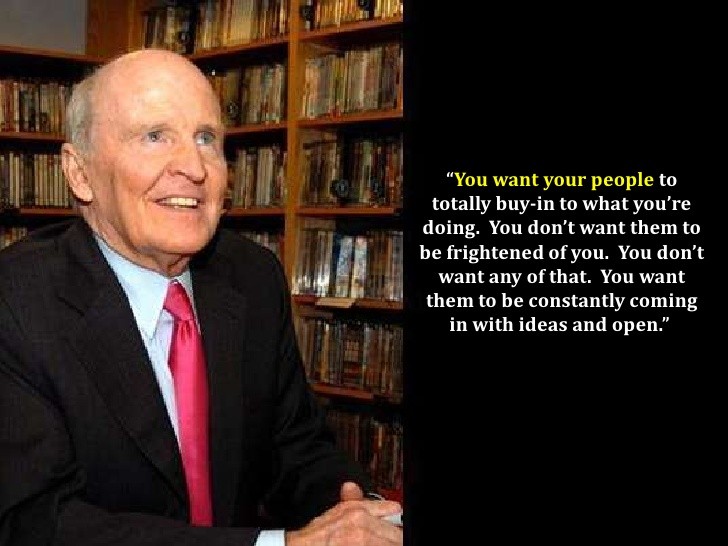You Don t Know Jack Welch
Post on: 16 Март, 2015 No Comment

Jack Welch didn’t build General Electric (NYSE:GE ) from the ground up — it was over a century old when he took over — but he did transform it and rewrite the book on management while doing so.
To the surprise of many experts who said that GE was too large to be a growth stock. only worth investing in for the dividend. Welch pushed GE to double-digit growth during the two decades he spent at the helm. In this article we’ll look at the meteoric rise of Jack Welch, and what lessons can be learned for climbing the corporate ladder.
A Boy with a Stutter
Jack Welch was born on November 19, 1935, in Peabody, Massachusetts. His parents (especially his mother, Grace) are credited with instilling a sense of self-confidence in their son that served him throughout his entire career.
Jack had a slight stutter throughout his childhood, but it didn’t keep him from excelling both in school and sports. He received his degree in chemical engineering in 1957, and completed a PhD in 1960, whereupon he joined General Electric as a junior engineer. (With job requirements rising daily, find out if you need an MBA to stay competitive, see Should You Head Back To Business School? and Invest In Yourself With A College Education . )
Going the Extra Mile
Welch’s first project was developing a new plastic, polyphenylene oxide (PPO), for industrial use. He worked with a small development team and, due to GE’s sprawling structure, often ended up having to sell his project to senior R&D scientists to get their help on it.
Welch built up a good relationship with Reuben Gutoff, a rising executive at GE, simply by always going the extra step and delivering more than was asked for. When Gutoff wanted an analysis of the project, Welch provided it — along with a cost analysis stacking against similar products from competing companies like DuPont (NYSE:DD ). This was part of his strategy to get out of the pile by exceeding expectations and offering a new, and hopefully valuable, perspective to his superiors. (Make sure the business you built continues to thrive long after you’ve left the helm, see How To Create A Business Succession Plan .)
Welch Quits
When the bureaucratic nature of a large corporation like GE began to grate on Welch, particularly the standardized raises for all first-year employees, he tried to quit. However, Gutoff convinced him to stay on by offering him a larger raise and promised management positions in the future. Gutoff also agreed to help Welch circumvent some of the bureaucracy that had built up at GE. The special treatment Welch received from Gutoff went a long way to cementing his later policies of differentiation.
The Big Blowup
When a spot opened for project manager of the PPO product sales, Welch hounded Gutoff for the job despite a lack of experience in the area. He obviously had some talent for selling because he got the job. Welch made a point of celebrating every success his team had, holding a party whenever $5,000 worth of orders for plastic accumulated. Due to his team’s sales success, Welch was promoted to general manager of the entire plastics division in 1968. This made him GE’s youngest general manager at the age of 32. (CEOs, CFOs, presidents and vice presidents: learn how to tell the difference in The Basics Of Corporate Structure .)
Plastics was a bit of a mutt in the GE stables, just getting to the breakeven point after years of capital intensive research. Welch, young and confident, predicted that GE’s plastics business would double and compete against DuPont, the 800-pound gorilla of chemical products. Welch and his team went on an unprecedented advertising spree. This involved billboards, radio promos, and even a parking lot demonstration where major league pitcher Denny McLain threw fastballs at Welch while he held a sheet of industrial plastic up as protection.
Welch met his goal of doubling the business within three years and also solidified his management style. Welch was frank and even a little callous dealing with incompetence, quickly firing anyone not performing to his satisfaction, but he was also very generous with those who did. Those he approved of could expect to work very hard, but they also got paid very well. On the strength of his results, Welch was promoted to run the entire chemical metallurgical division in 1971.
Welch continued to focus on hiring and keeping the best people, just on a larger scale. His hiring and firing brought unfriendly scrutiny from further up the hierarchy in GE. The company had increasingly turned to years of service and a flawed employee review system as criteria for promotion, but Welch was flying in the face of that by promoting and hiring on merit.
In 1973, Welch wrote in his performance report that one of his long-term goals was to be CEO of the company. That same year he was promoted to the level of group manager, overseeing several divisions worth $2 billion. Unable to intimately understand every business from X-rays to semiconductors, the people running the business became even more vital to Welch. From 1973 to 1980, Welch brought this people-first concept to progressively higher posts.
He had spent over a year selling the GE board on why it needed this deal and now was forced to admit he had made a mistake. For some members of the board, the fact that Welch had made a mistake and acted quickly to fix it was a point in his favor. In 1980, with the consent of the board, Reginald Jones told Welch he would be the new CEO of GE.
Conclusion
Think you have what it takes to be chief executive? Find out what those at the top have in common, check out Becoming A CEO .














